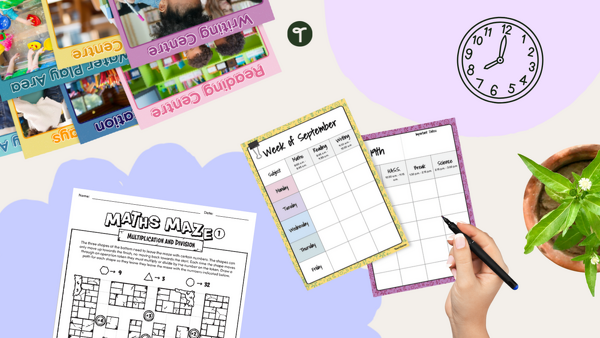Squid Game is a series streaming on Netflix that is not only breaking the ‘most-streamed series ever’ record, but it’s also filtering down to some of our youngest children in our primary schools. We were recently made aware of school children as young as 6 being exposed to this Netflix show. If you haven’t yet watched Squid Game, it’s certainly not been designed for young people’s eyes, that’s for sure! However, they are seeing it or being exposed to aspects of it through Netflix, YouTube, Instagram, TikTok, and even Roblox.
To further clarify this evidence, we asked our teaching community if they had witnessed children talking about or acting out aspects of this show. We were shocked by the response. Every teacher who responded to our question on Instagram stated they had witnessed children talking about this show with their peers, or playing some of the ‘children’s games’ seen on the show. We invited our good friend Trent from the Cyber Safety Project to take over our Instagram stories to provide our followers with his top tips for dealing with this emerging situation in our primary schools.
This blog outlines five extremely helpful and practical tips for our teaching community in relation to the series Squid Game.
Tips for Dealing with ‘Squid Game’ Behaviours at School
First of all, what is this show all about? It’s a series where game players are systematically tortured or killed over a series of well-known children’s games. For example, instead of getting ‘out’ when you move in the well-known game ‘Red light, Green light’ you are killed instead. Not only that, the show features a lot of adult themes not for young children’s eyes including, threats of violence towards women, gruesome killings, gambling, conning money, and adults having sex. So, as a teacher, what can you do if you notice children talking about this show?
Tip 1: Knowledge is Power
This tip is all about being proactive with the parent community to make sure they are well informed of the fact that Squid Game exists, and the different ways that young children may be able to access the show. If this is a topic that is being seen across year levels, a whole school communication home to parents may be a good idea. An info sheet about Squid Game and tips for parents about how children are accessing the show would be helpful.
Here are the main ways that children are accessing Squid Game, or parts of the show:
- Netflix (parental controls can be used so that when ‘Squid Game’ is searched nothing shows up)
- YouTube (it won’t show up on Kids YouTube)
- TikTok
- World in Roblox
Tip 2: Make Sure You’ve Got Your Ear to the Ground
Are you aware of the lingo that is centered around Squid Game?
This tip is a little bit of knowledge is power as well. Understanding the different games that are featured on the show is going to be helpful for teachers in order to pick up on behaviours before they get out of hand. Here are some of the games that are played throughout the Squid Game series:
- Red Light, Green Light
- Marbles
- Tug of War
- Round circles of honeycomb with shapes on them
So, understanding how that game is referenced in the show is really important. Some of these may be popular games that mean no harm, but if they are playing a game and instead of just being ‘out’ the eliminated players are pretending to die – this could be an indication that some of these children have been exposed to the show.
Tip 3: Bring up School Values
If you are noticing children having conversations about Squid Game, or possibly playing some of the games, it might be time for you to have a conversation about the school values. Ask the students questions such as:
- Why aren’t violent games in line with our school values?
- If a friend asks you to play a Squid Game-style game, what could go wrong?
Conversations are vital to empowering your students to take ownership of this situation. This will also help them to understand why this style of game play may be damaging to them and others around them.
Tip 4: Talk about Emotions in Circle Time
If this style of game play relating to Squid Game is happening at your school, you may notice that this begins to impact the relationships of the young children in your class. During circle time it may be a good idea to talk about emotions using some emotion cards. And start to have some restorative conversations with your students.
Tip 5: Promote Help-Seeking Strategies
Help your students recognise the importance of talking to somebody when they see something, particularly online, that is making them feel unsafe, uncomfortable, worried, or scared.
You may like to create a worry jar for your classroom and invite students to write down things that may be worrying them. This is a great way to encourage communication about something that they may find too scary to talk about.
Highlight the people, processes and places they can go to at school if they are feeling unsafe or finding something uncomfortable. There are also external resources that kids can access as well, such as, Kids Helpline.
We were so thankful for Trent sharing his wisdom with us around this emerging situation in our schools. For more information, or for some parent tips – head to their blog – Squid Game: Netflix record breaking series warning for parents and educators. They’ve got some great question prompts highlighted in this blog as well.
To join the conversation – head to our Squid Game post in our Teacher Talk Facebook group.
Blog image: Shutterstock.com / Pavel1964







Thanks for writing this article. I can't believe the day after reading it I heard kindy kids playing Red Light, Green Light as a squid game!
No worries, Colleen! There's always something new that affects students, just like in our own childhoods, so it's always good to keep an ear to the ground to help students, contextualise things they may have seen, and offer them support.